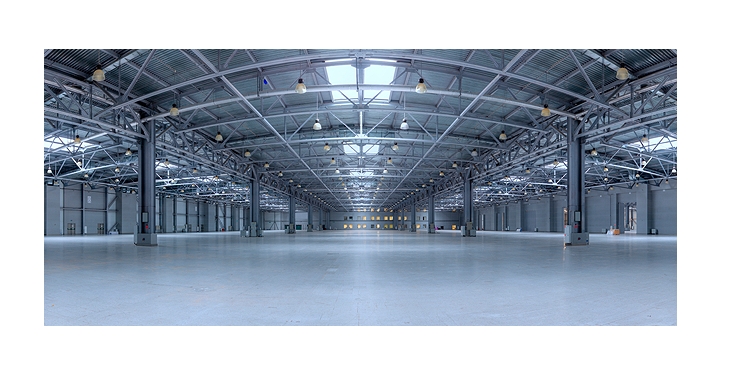Best Industrial Space for Rent – Tenants in industrial parks come from many walks of life. However, not every industrial facility will meet your requirements. Here are some things to consider before signing a lease for an industrial location. As the cost of renting office space in Boulder grows, entrepreneurs, tech firms, and even merchants are searching for other places to base their operations. In many circumstances, industrial parks have emerged as a viable option.
These open adaptable rooms have several advantages. In addition to the potential for reduced rent, industrial buildings may have a distinctive ambiance that appeals to a wide range of people, as well as open work settings that promote employee cooperation and productivity. Industrial spaces, on the other hand, were designed for industrial activities, so there are a few things to think about before signing a lease.
It’s one thing to have brick walls and towering ceilings. A fully barren, un-insulated environment, on the other hand, is generally not what you have in mind. Other crucial issues to examine if you’re thinking about leasing an industrial space for your business:
- Before you move in, how much work does the place require?
- How much freedom do you have to change it?
- Are the utilities appropriate?
- Is the area equipped with the essentials for office operations, such as enough electricity, heat, and phone lines?
- What about the Internet?
- Do you know how much bandwidth you’ll need and whether you’ll be able to get it?
- Who are your next-door neighbors? Are you able to tolerate the smells of a wide range of foods?
- That bakery next door might smell like heaven at first. Will it, however, become a distraction over time?
- What kind of machinery will be operating next door, and how loud will it be?
- Is there a lot of truck traffic, and can you handle it?
What are the industrial park’s rules and regulations? Consider signs; do you require people to be able to locate you? Will you be able to put up signs to direct guests to your door not just at the park’s entrance, but also within the area?
What will the terms of your lease be? How are the lease conditions for the space different from those for regular office spaces? Will you be able to share a room with another renter, sign a longer lease, or receive any amenities?
A broker with expertise with a range of properties will be able to answer all of your questions, point you in the direction of industrial sites that are suitable for your company, and present you with several possibilities to explore. Brokers can answer your questions throughout the process, point you in the direction of resources for adapting to a new place, and even assist you in negotiating a contract that assures a good match and reasonable terms.
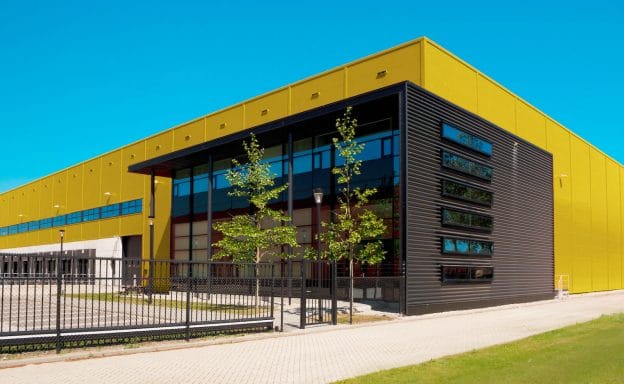
The prospect of establishing a new company location — and making it your own — is exhilarating. Just keep in mind that you aren’t on your own!
Which are the top industries that lease industrial space?
Retail (e-commerce and conventional), 3PL, food & beverage, paper/packaging, logistics/distribution, consumer non-durable goods, pet food/supplies, biomed/biotech/pharma/healthcare, consumer durable goods, and auto, auto parts & tires are the main industries occupying and leasing industrial space.
However, researchers were unable to locate real square footage leased by these businesses. Top sectors utilize industrial space by tenant size, which is associated with space needed and leased by industry suppliers, according to research papers that evaluated the industrial real estate market. A summary of the industrial real estate market, as well as some insights into the top industry with the biggest demand for industrial space, were also provided. The findings and approach are discussed in detail below.
OVERVIEW – FORECAST and TRENDS
In the second quarter of 2016, 70.1 million square feet of industrial space was leased, bringing the total for the first and second quarters to 132.2 million square feet. Furthermore, for the past 25 quarters, warehouse availability has decreased. As a result, rental rates have risen by around 4.1 percent. Industrial space construction has also expanded as a result of the growth, with developers constructing around 99.9 million square feet of additional space.
In addition, 2017 appears to be a strong year for industrial real estate. The quarterly net absorption of square footage is expected to be 64 million square feet. Despite the fact that experts are positive about growth, it is probable that rising demand will continue to rise inflation, interest, and rental rates, resulting in a fall in consumer and company expenditure. According to business models, net absorption of square footage will likely drop in 2018, although this is unlikely to influence industrial space utilized as a last distribution hub before delivery to consumers.
Changes in ownership, foreign investments, retail development, fulfillment centers, and managing risks within the supply chain are some of the factors influencing the real estate industry, according to NAIOP (Commercial Real Estate Development Association). Industrial and distribution properties have seen ownership change hands and become more institutionalized in recent years. As a result, fewer properties are owned by fewer people, reducing local competition. Sales of industrial real estate have also been boosted by foreign capital investment. Singapore, for example, has been aggressively acquiring industrial buildings in the United States and is now the country’s second-largest logistics property owner.
In addition, to fulfill ever-increasing client demand, retail sectors are likely to increase leasing and industrial space sales, mostly in “big box” locations. As e-commerce expands, businesses may look to lease or own fulfillment centers close to their large client base, which may necessitate numerous fulfillment sites. Distributors continue to be concerned about supply chain interruptions, and supply chain managers must manage these risks. Because these interruptions have an indirect impact on industrial developers and owners through their clients, these sorts of occurrences have been closely monitored.
Top 10 Industries Leasing Industrial Space for Rent
The top ten industries occupying and leasing industrial space for rent are shown below. The list is sorted by tenant size from largest to smallest.
- Retail (E-Commerce): Tenant size – 337,660, Retail (Traditional): Tenant size – 206,149
- Beverage and Food: Tenant size – 168,927
- 3PL: Tenant size – 167,988
- Distribution and Logistics: Tenant size – 146,507
- Packaging and Paper: Tenant size – 134,669
- Pet Food & Supplies: Tenant size – 129,627
- Consumer Non-Durable Goods: Tenant size – 125,874
- Consumer Durable Goods: Tenant size – 124,409
- Biomed/Biotech/Pharma/Healthcare: Tenant size – 114,331
- Auto, Auto Parts & Tires: Tenant size – 109,273
Linquip was also able to determine which industrial markets had the most rented space.
- Warehouse & Distribution: 9,075,805,045 sq. ft.
- Manufacturing: 3,153,250,316 sq. ft.
- Specialty Purposes: 63,751,506 sq. ft.
Warehouse & Industrial Space for Rent LA County
We placed the Warehouse & Industrial Space for Rent LA County here as an example of our extensive research on Linquip. In Los Angeles County, there are now 725 industrial space ads for lease or rent. Here are a few descriptions:
The average cost of a warehouse in Los Angeles is $0.82 to $1.53 per square foot. Paramount, Industry, Hawthorne, Downey, Long Beach, La Mirada, and Commerce are all good places to rent industrial space.
One of the most popular places to lease warehouse space is Los Angeles, California. Due to scarcity of available rental space in the Los Angeles market, rental rates have risen. The San Fernando Valley, Downtown, San Gabriel Valley, and South Bay are all popular places to rent warehouse space. Freely browse the warehouse rental listings in Los Angeles County below.
Featured Properties
Industrial and Warehouse Space in La Mirada for lease
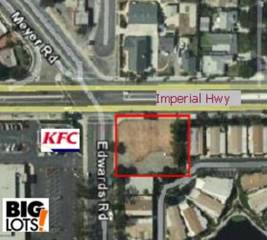
- SEC Imperial Hwy & Edwards St, La Mirada, CA 92562
- 1 Listing Available
- Size: 18,596 SF
- Uses: Industrial, Warehouse
Industrial, Office, and Warehouse Space in Carson for lease
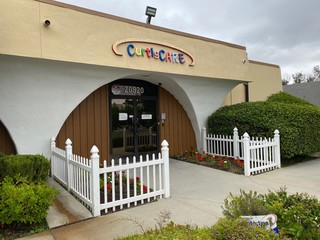
- 20920 Chico St, Carson, CA 90746
- 1 Listing Available
- Size: 18,064 SF
- Uses: Industrial, Office, Warehouse
Industrial and Warehouse Space in Signal Hill for lease
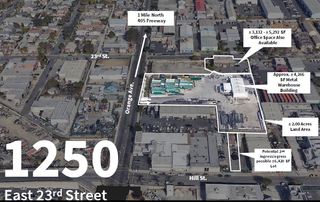
- 1250 E 23rd St, Signal Hill, CA 90755
- 1 Listing Available
- Size: 87,120 SF
- Uses: Industrial, Warehouse
Industrial and Warehouse Space in Santa Fe Springs for lease
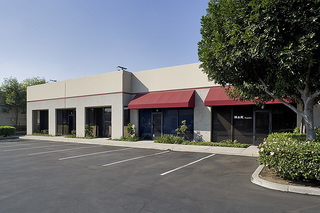
- 13630 Imperial Highway, Santa Fe Springs, CA 90670
- 1 Listing Available
- Size: TBD SF
- Uses: Industrial, Warehouse
17605 Fabrica Way, Cerritos, CA 90703
- 1 Listing Available
- Size: 2,500 SF
- Uses: Industrial, Warehouse
FAQs about Industrial Space for Rent
How do you find industrial space for rent?
Online resources are the quickest and easiest method to obtain a sense of what’s available in your preferred industrial property market. These platforms are comparable to those used to look for a house, such as Zillow or Redfin in the case of commercial real estate.
What is the difference between residential & commercial retail space?
Homes and flats are examples of residential properties. Commercial property, on the other hand, is any property that is not primarily utilized for residential purposes, such as office spaces, retail spaces, and warehouses.
Why Retail Is the Leading Industry Leasing Industrial Space?
The demand for industrial space, particularly in e-commerce, has been driving up rental costs. As a result of demand outstripping supply, merchants are scrambling to find a leasable warehouse and distribution space that will allow them to reach their huge consumer base. The trend of rising rental rates is projected to continue in 2017. Although the demand-supply imbalance continues to be a source of concern for retailers, it is envisaged that this will eventually balance out, resulting in a slowdown in the demand for industrial space.
Why is commercial property cheaper than residential?
Commercial properties might be prohibitively expensive for first-time investors when compared to residential homes. This is due to the fact that commercial properties require more on-site upkeep and often have bigger land plots than residential homes.
Can a residential property be used as a commercial?
Without approval, you cannot convert a residential property into a commercial property. If you live in a rental flat and want to make one for commercial reasons, say you want to open a salon in your apartment, you must follow the legislation. In such a situation, you’ll need to get your landlord’s permission.
Conclusion
Retail (e-commerce and conventional), food & beverage, 3PL, logistics/distribution, packaging/paper, pet food/supplies, consumer non-durable goods, consumer durable goods, biotech/biomed/healthcare/pharma, and auto, auto parts & tires are the top businesses leasing industrial space for rent. Throughout 2017, the industrial real estate market grew at a rapid pace, with a predicted slowdown in 2018. However, fulfillment and distribution hubs are unlikely to be affected by this drop.
If you are ready to automate inventory management or are looking for a solution to increase efficiency, or if you have another question regarding industrial space for rent or any other warehouse equipment or services, call now to talk with one of our Linquip Experts. Thank you for deciding to use Linquip!
Buy Equipment or Ask for a Service
By using Linquip RFQ Service, you can expect to receive quotations from various suppliers across multiple industries and regions.
Click Here to Request a Quotation From Suppliers and Service Providers
Read More In Linquip

